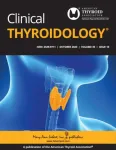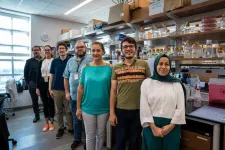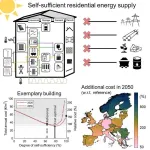(Press-News.org) It’s a multi-billion dollar question: What will happen to water as temperatures continue to rise? There will be winners and losers with any change that redistributes where, when and how much water is available for humans to drink and use.
To find answers and make informed predictions, scientists look to the past. Reconstructions of past climate change using geologic data have helped to show the far-reaching influence of human activity on temperatures since the Industrial Age. But assembling hydroclimate records for the same timeframe has proved to be much harder.
A study from the Past Global Changes (PAGES) Iso2k project team, led by Bronwen Konecky at Washington University in St. Louis, takes an important step toward reconstructing a global history of water over the past 2,000 years. Using geologic and biologic evidence preserved in natural archives — including 759 different paleoclimate records from globally distributed corals, trees, ice, cave formations and sediments — the researchers showed that the global water cycle has changed during periods of higher and lower temperatures in the recent past.
“The global water cycle is intimately linked to global temperature,” said Konecky, an assistant professor of earth, environmental and planetary sciences in Arts & Sciences at Washington University and lead author of the new study in Nature Geoscience.
“We found that during periods of time when temperature is changing at a global scale, we also see changes in the way that water moves around the planet,” she said.
The water cycle is complex, and rainfall in particular has geographic variations that are much more drastic than air temperature. This has made it difficult for scientists to evaluate how rainfall has changed over the past 2,000 years.
“We decided to start with water isotope records because they reflect holistic signals and because they’re recorded in all kinds of different natural archives,” Konecky said. “This is a first step toward reconstructing drought or rainfall patterns at the global scale during the past 2,000 years.”
An intertwined cycle
The global water cycle is vast and intertwined. Water evaporates from the surface of the Earth, rises into the atmosphere, cools and condenses into rain or snow in clouds, and falls again to the surface as precipitation. Each water molecule that is part of the cycle has a certain isotopic ‘fingerprint,’ or composition, which reflects small variations in the atomic weight of the oxygen and hydrogen atoms that comprise the molecule. So, individual water molecules can be heavier or lighter.
With this new study, the scientists found that when global temperature is higher, rain and other environmental waters become more isotopically heavy. The researchers interpreted these isotopic changes and determined their timeline by synthesizing data from across a wide variety of natural archive sources from the past 2,000 years of Earth history.
The PAGES Iso2k project team — which includes more than 40 researchers from 10 countries — collected, collated and sometimes digitized datasets from hundreds of studies to build the database they used in their analysis. They ended up with 759 globally distributed time-series datasets, representing the world’s largest integrated database of water isotope proxy records.
Piecing together signals from many different types of natural archives can be like piecing together apples and oranges. Konecky and the project team knew, however, that water isotopes record climate signals in specific ways in different natural archives. Carefully assembled, this common thread could help them to compare a tree ring to an ice core.
“Every archive is different,” Konecky said. “To make matters more complicated, datasets from different archives are generated by different scientific communities with their own terminology, norms and reference materials. We came up with data description fields (metadata) for the database that translate each record’s particularities into a common tongue that makes it possible to compare variations in one archive to variations in another. This process took years!”
The team met once in person and then did everything afterward by teleconference. They organized co-working sessions at odd hours to accommodate time zones from Hawaii to Japan to Australia to Europe and in between. “We even spent one New Year’s Eve working on the database and the analyses that led to this paper,” Konecky said.
More water cycle changes to come
Global scale relationships between temperature and the isotopic composition of certain environmental waters, like seawater and glacial ice, have long been recognized as the planet moves in and out of ice age cycles. Local scale relationships with temperature on timescales of minutes to months are also well established.
But this study provides the first evidence that temperature and the isotopic composition of environmental waters go hand in hand at timescales in between these two — that is, over decades to centuries.
It’s a rapid adjustment, Konecky said. “As the planet warms and cools, it affects the behavior of water as it leaves the oceans and the vigor of its motions through the atmosphere,” she said. “The isotopic signals in these waters are very responsive to temperature changes.”
The scientists found that global mean surface temperature exerted a coherent influence on the isotopic composition of global precipitation and “meteoric water” (water in lakes, rivers and ice melts) throughout the past 2,000 years. The changes they observed were driven by global ocean evaporation and condensation processes, with lower values during the period of time known as the Little Ice Age (1450-1850) and higher values after the onset of human-caused climate warming starting around 1850.
When it comes to the specific impact of these changes on future rainfall and water availability, it is too early to predict who will win and who will lose. But this study’s data from the last 2,000 years suggest that more water cycle changes are likely as global temperatures continue to increase. June, July and August 2023 were the hottest months on record for our planet.
“The way water behaves when it leaves the oceans and moves around the atmosphere and rains out — that behavior is strongly impacted by changes in atmospheric temperature,” Konecky said.
END
Study links changes in global water cycle to higher temperatures
Over last 2,000 years, rising and falling temperatures have altered the way water moves around the planet
2023-11-02
ELSE PRESS RELEASES FROM THIS DATE:
Metabolite tells cells whether to repair DNA
2023-11-02
Metabolites called nucleotides are the building blocks of DNA and can impact cancer’s sensitivity or resistance to chemotherapy and radiation in brain cancer.
Findings from researchers at the University of Michigan Health Rogel Cancer Center, published in Cancer Discovery, show how a specific nucleotide metabolite, called GTP, controls responses to radiation and chemotherapy in an unexpected way.
“We learned that if you increase a cell’s GTP levels, it makes it really resistant to ...
American Thyroid Association® names Trevor E. Angell, MD new Editor-in-Chief of Clinical Thyroidology®
2023-11-02
The American Thyroid Association® (ATA®) is pleased to announce that Trevor E. Angell, MD has been selected as the new Editor-in-Chief of the ATA monthly journal Clinical Thyroidology®. Dr. Angell’s term as Editor-in-Chief will begin in January 2024.
Clinical Thyroidology is one of the ATA’s official journals and is published in partnership with Mary Ann Liebert, Inc. This highly valued abstract and commentary publication provides a comprehensive look at clinical thyroid literature. Experts ...
Hollings researchers uncover new targets for breast cancers resistant to standard therapies
2023-11-02
Researchers at MUSC Hollings Cancer Center believe that some drugs already approved by the U.S. Food and Drug Administration or currently in clinical trials could be repurposed for certain breast cancer patients whose cancer has become resistant to standard therapies.
Ozgur Sahin, Ph.D., a professor and SmartState Endowed Chair in the Department of Biochemistry and Molecular Biology, led the research, which was published Nov. 2 in Nature Communications.
The research, funded by an American Cancer Society Research Scholar Grant, started as an investigation into cancer resistance to the drug tamoxifen but expanded as the research questions led down new ...
Start-up dedicated to developing new antibiotics
2023-11-02
It all began with basic research: While conducting laboratory experiments, a team at the Technical University of Munich (TUM) came across an active agent against multidrug-resistant bacteria with a fundamental difference to antibiotics developed to date. The researchers have since established a start-up to develop a new drug based on this agent. The entrepreneurs have now been nominated for Science Breakthrough of the Year in the Science Start-Up category at the international Falling Walls summit.
Rising numbers of bacteria are developing ...
Two million European households could abandon the electrical grid by 2050
2023-11-02
Researchers report that 53% of European freestanding homes could have supplied all their own energy needs in 2020 using only local rooftop solar radiation, and this technical feasibility could increase to 75% in 2050. Publishing November 2 in the journal Joule, the study shows that there is no economic advantage for individual households to be fully self-sufficient under current or future conditions, though in some cases the costs are on par with remaining on-grid. The researchers estimate that self-sufficiency will be economically feasible for 5% (two million) of Europe’s 41 million freestanding single-family homes in 2050, ...
One sleepless night can rapidly reverse depression for several days
2023-11-02
All-nighters can cause giddy and slap-happy feelings
This effect is caused by increased dopamine release in distributed brain regions
This dopamine signal also enhances plasticity in the neuronal connections, causing a potent antidepressant effect that lasts for days
Study suggests that prefrontal cortex and its dopamine inputs are key for rapid plasticity and antidepressant effects after brief sleep loss
EVANSTON, Ill. — Most people who have pulled an all-nighter are all too familiar with that “tired and wired” ...
Circuit-specific gene therapy brings new hope for treatment of Parkinson’s disease
2023-11-02
Researchers from the Shenzhen Institute of Advanced Technology (SIAT) of the Chinese Academy of Sciences (CAS) and their collaborators have developed a gene therapy strategy to selectively manipulate Parkinson's disease-affected circuitry and attenuate the core motor symptoms of Parkinson's disease in rodent and nonhuman primate animals.
The study was published in Cell on Nov. 2.
Parkinson's disease, characterized by the loss of midbrain dopaminergic neurons, is one of the most common neurodegenerative diseases in the elderly population, affecting more than 6 million people worldwide.
Dopamine ...
Higher risk of breast cancer in women with false positive mammography result
2023-11-02
Women who receive a false positive mammography result are more likely to develop breast cancer over the subsequent 20 years, report researchers from Karolinska Institutet in a study published in JAMA Oncology. The risk is highest for women aged between 60 and 75 and who have low breast density.
In global terms, breast cancer is the most common form of cancer among women, and screening is an important tool for catching women with a tumour at the earliest possible stage. In Sweden, all women between ...
PTSD symptoms and cardiovascular and brain health in women
2023-11-02
About The Study: In this study of 274 midlife women, greater posttraumatic stress disorder (PTSD) symptoms were associated with higher carotid atherosclerosis and, among women who were APOEɛ4 carriers, greater brain small vessel disease and poorer cognitive performance. These findings point to the adverse implications of PTSD symptoms for cardiovascular and neurocognitive health among women in midlife, particularly for women who are APOEɛ4 carriers.
Authors: Rebecca C. Thurston, Ph.D., of the University of Pittsburgh, is the corresponding author.
To access the embargoed ...
Breast cancer incidence after a false-positive mammography result
2023-11-02
About The Study: The findings of this study suggest that the risk of developing breast cancer after a false-positive mammography result differs by individual characteristics and follow-up. These findings can be used to develop individualized risk-based breast cancer screening after a false-positive result.
Authors: Xinhe Mao, M.Sc., of the Karolinska Institutet in Stockholm, is the corresponding author.
To access the embargoed study: Visit our For The Media website at this link https://media.jamanetwork.com/
(doi:10.1001/jamaoncol.2023.4519)
Editor’s Note: Please ...
LAST 30 PRESS RELEASES:
Chimps’ love for crystals could help us understand our own ancestors’ fascination with these stones
Vaginal estrogen therapy not linked to cancer recurrence in survivors of endometrial cancer
How estrogen helps protect women from high blood pressure
Breaking the efficiency barrier: Researchers propose multi-stage solar system to harness the full spectrum
A new name, a new beginning: Building a green energy future together
From algorithms to atoms: How artificial intelligence is accelerating the discovery of next-generation energy materials
Loneliness linked to fear of embarrassment: teen research
New MOH–NUS Fellowship launched to strengthen everyday ethics in Singapore’s healthcare sector
Sungkyunkwan University researchers develop next-generation transparent electrode without rare metal indium
What's going on inside quantum computers?: New method simplifies process tomography
This ancient plant-eater had a twisted jaw and sideways-facing teeth
Jackdaw chicks listen to adults to learn about predators
Toxic algal bloom has taken a heavy toll on mental health
Beyond silicon: SKKU team presents Indium Selenide roadmap for ultra-low-power AI and quantum computing
Sugar comforts newborn babies during painful procedures
Pollen exposure linked to poorer exam results taken at the end of secondary school
7 hours 18 mins may be optimal sleep length for avoiding type 2 diabetes precursor
Around 6 deaths a year linked to clubbing in the UK
Children’s development set back years by Covid lockdowns, study reveals
Four decades of data give unique insight into the Sun’s inner life
Urban trees can absorb more CO₂ than cars emit during summer
Fund for Science and Technology awards $15 million to Scripps Oceanography
New NIH grant advances Lupus protein research
New farm-scale biochar system could cut agricultural emissions by 75 percent while removing carbon from the atmosphere
From herbal waste to high performance clean water material: Turning traditional medicine residues into powerful biochar
New sulfur-iron biochar shows powerful ability to lock up arsenic and cadmium in contaminated soils
AI-driven chart review accurately identifies potential rare disease trial participants in new study
Paleontologist Stephen Chester and colleagues reveal new clues about early primate evolution
UF research finds a gentler way to treat aggressive gum disease
Strong alcohol policy could reduce cancer in Canada
[Press-News.org] Study links changes in global water cycle to higher temperaturesOver last 2,000 years, rising and falling temperatures have altered the way water moves around the planet




